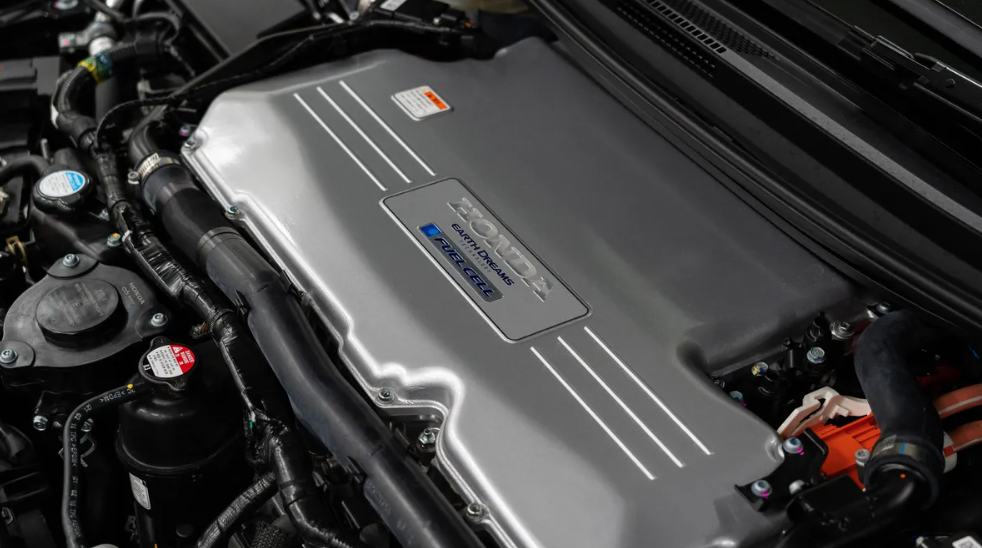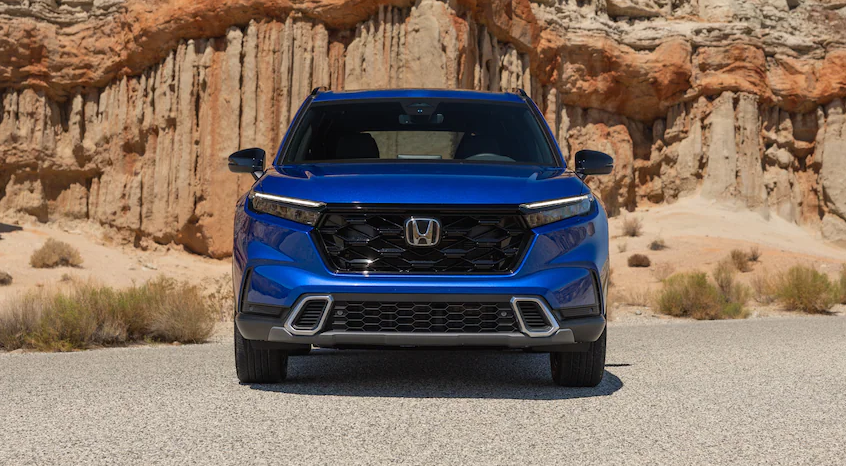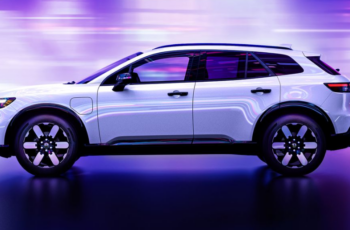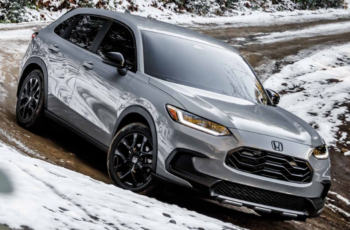Honda’s next hydrogen-powered vehicle is expected to be a variant of the CR-V that has plug-in power. The automaker began discussions about this successor to its earlier H2 vehicle, the Clarity Fuel Cell, which was canceled in 2021 and the story surrounding the powertrain is beginning to become more clear.
Honda has announced that 2022 the new fuel cell car, based on the CR-V will be available in 2024 across North America and Japan. This hydrogen-powered SUV is expected to utilize fuel cell technology that was developed by GM and will feature two H2 tanks at the back of the car, a smart power unit beneath the seats, and an engine and drive unit that will be mounted in the front of the hood. The battery that is in the plug-in portion of the equation isn’t going to supply power to the CRV for long distances and appears to be small enough to be a waste of place on Honda’s sketchy model of the forthcoming vehicle. Honda stated that the hydrogen CR-V will also include an export power function.
Who’s Going to Get This CR-V?
Honda hasn’t announced that the H2 CRV will be offered outside of California as the sole location in which it is possible to lease the Clarity Fuel Cell could be leaseable, but they did mention that manufacturing of the fuel cell CRV will start by 2024, at the Performance Manufacturing Center in Ohio and include vehicles that are exported to Japan.
Honda remains elusive about any specifics about the car however, it did release more details regarding the CRV’s new fuel system, which is the next generation. Ryan Harty, senior manager and division leader of the business unit at American Honda Motor Company, stated that the new system is nearly twice as robust and features “significantly faster” startup times in frigid temperatures (under 22 degrees F). Furthermore, Harty said, compared to the fuel cell technology that was used in the defunct Clarity the new system is less expensive to construct. The huge reduction is due to improvements in the materials used such as using “innovative materials” for electrodes and manufacturing specifications, and the plan to create more units.
Although the Clarity Fuel Cell has indeed been in production for over an entire year, Honda isn’t throwing in the water on hydrogen technology. They’ve been working on more development for next-generation systems. The company also released additional details regarding these plans on Wednesday, including the progress with the hydrogen-powered CR-V vehicle that was teased earlier in the year.
At present, it appears that the FCEV constructed on Honda’s brand new CR-V crossover model is only one element of its hydrogen-powered plan. It plans to integrate its fuel cell technology into commercial vehicles as well as construction machinery and stationary power stations for the generation of electricity that is CO2-free. The key element of this process is the next-generation fuel cell system that Honda is developing together with General Motors. The two companies announced the collaboration last week. one of the products’ first appearances will be the CR-V-based hydrogen-powered model.
When it will come out in 2024, there could be some slight changes to what we were expecting to hear in this year’s announcement. It might not have the designation “CR-V FCEV”, nor will it be just an electric vehicle. This technology will remain central to the car but don’t make any mistakes. Honda announced that it will also feature a lithium-ion battery which you can plug in to charge, then drive off.
Future
Honda has not disclosed the number of Clarity Fuel Cell cars it offered, but an official told Car and Driver that there was a total of 2116 leases for the variant across the U.S. However, considering that Honda only sold around 41,000 of the various models of Clarity vehicles in the five years that it was on sale (most of these being plug-in hybrid versions) it is likely that the company is only required to boost production to boost the efficiency of scale.
Honda has announced plans to construct about 2000 units of the next-generation fuel cell system per year in 2025 at its Fuel Cell System Manufacturing Center which Honda and GM operate in Michigan. In 2030, Honda plans to build an annual 60,000 units of this model or improved technology for fuel cells. Honda has not yet announced manufacturing or development partners for the next-gen system (in other terms, GM is not necessarily involved) but is planning to make it more efficient and cost-effective.
“Compared to the next-generation system, we set additional targets to reduce the cost by one-half and to double the durability,” Harty stated. “We’re targeting to make the future-generation system to be comparable with diesel engines in terms of ease of use and total cost of ownership.”
Honda has said that it views fuel cell technology as an essential component of a carbon-neutral economy and doesn’t want to just incorporate them into cars. The automaker is seeking partners to test the technology in stationary power stations and construction equipment. Harty added that Honda is looking to find companies across North America to work on commercial vehicles powered by fuel cells. Honda tests hydrogen-powered trucks in China in partnership with Dongfeng Motors and will start by the end of March 2024 in Japan together with Isuzu. In the middle of 2020, Honda will begin selling its fuel cell technology to its partners in the industry and transportation sectors.
2024 Honda CR-V Hydrogen Release Date & Price
“Our is really about announcing that the fuel cell power train is technically ready to step in and help not only Honda but other companies to achieve their carbon neutrality and sustainability goals,” Harty declared. “To do that, together, we have to develop the business ecosystem and the hydrogen infrastructure around that for those customers to achieve their goals.” It’s believed that the Honda CR-V Fuel Cell EV is scheduled to be available in 2024. It’s unclear whether it will be a 2024 or 2025 model-year vehicle.
Honda CR-V EV prices have not been released yet. To give you an example, CR-V Hybrid prices currently begin at $33,695 with the destination. Local and state Hydrogen fuel cell incentives for vehicles may aid in making the vehicle more affordable. In California, the eligible hydrogen vehicles are eligible for a $4,500 clean Vehicle Rebate.







